Student Blog
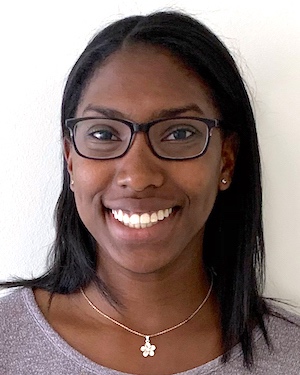
Getting Ready for the Big Exam ⟩
July 12, 2019, by Anijah
Hi Everyone!
There are ONLY two months left in the last summer of my undergraduate career. In the month since I finished the school year, I have accomplished a lot. However, there is still so much more that I need to do.
In this last month, I have traveled to Paris, worked my normal student job, and also worked in the Occupational Therapy (OT) department. The insight and the relationships that I have formed by working in OT have been invaluable. When I began this summer, I was not sure as to how I would pursue my passion for working in this field (should I take a gap year or immediately pursue a graduate degree in OT). I decided to pursue a graduate degree, with the first step being to take the Graduate Records Exam (GRE).
Before I take the GRE I have decided to prep for the exam. After I decided that I did not want to take a gap year between graduation and the start of OT school, I decided that the summer before my senior year I would study for the exam. Here are some tips I have, as I get ready to take the GRE, for other students that are also preparing to take the GRE:
- The first step is to select your test date on the official GRE testing website: https://www.ets.org. Depending on how much time you want to give yourself to prep for the exam, you can select the test date and test location on this website.
- Next is the preparation stage. We all have different ways to study, whether that be listening to an instructor in person, watching videos on topics, or using online tools to help you prepare. I am the type of person who learns better with videos that explain a specific type of question or general idea. For that reason, I choose a GRE prep system that gives me that freedom, and there are a variety of different ones to choose from. I recommend testing out different prep tools to determine what works best for your learning style and time frame for preparation.
- Now that you have found the right prep course, you can create a study plan that you intend on following. You can either create your own or use ones that are already created. The prep system I use, Magoosh, provides a variety of study plans depending on if you would like to study daily or weekly. You also get to choose if you are studying for only one week or 2-3 months. It is beneficial for someone to have a study plan when reviewing for the GRE because it is a lot of information. The structure of a study plan allows a person not to feel overwhelmed and breakdown topics for the person’s understanding.
- When developing your study plan build in a cushion. The cushion is because as you go through this process life is still happening; things outside of your plan may need to be handled and you may need to review topics longer than originally anticipated to get a clear understanding. Do not beat yourself up if your plan needs to be adjusted. Without a plan, there is nothing to adjust. That is when it becomes a free fall.
- Now that you have developed and worked your plan, it is test time. Remember that you are prepared and ready. You Got This!
I hope these tips will help anyone who is thinking about taking the GRE. There are a lot of resources and tools for the GRE that may be beneficial for you. Find the right one for you. As always, Fight On!
⋯

Summer is For Traveling ⟩
June 28, 2019, by Anijah
International School/Life Balance
My dad always tells me that it is very important to travel if you have the opportunity. My dad believes that traveling allows a person to see more of what the world has to offer. However, when the summer comes around my sister and I always go to the same places, such as Sacramento or Las Vegas with family. We go to these places because we are comfortable there. But this summer I decided to go to some new places.
Luckily, my sister was studying abroad this summer in Paris, so that was my first stop. During our time there we went to the usual tourist places such as the Eiffel Tower and various Museums. One of my favorite places that we visited, while in Paris, was the Saint Chappelle chapel because of the vibrant colors. If you ever get the chance to go to France, make sure you stop by to see the amazing glass work in the chapel. We also tested out some really cool restaurants, which allowed us to broaden our palettes and our waistlines.
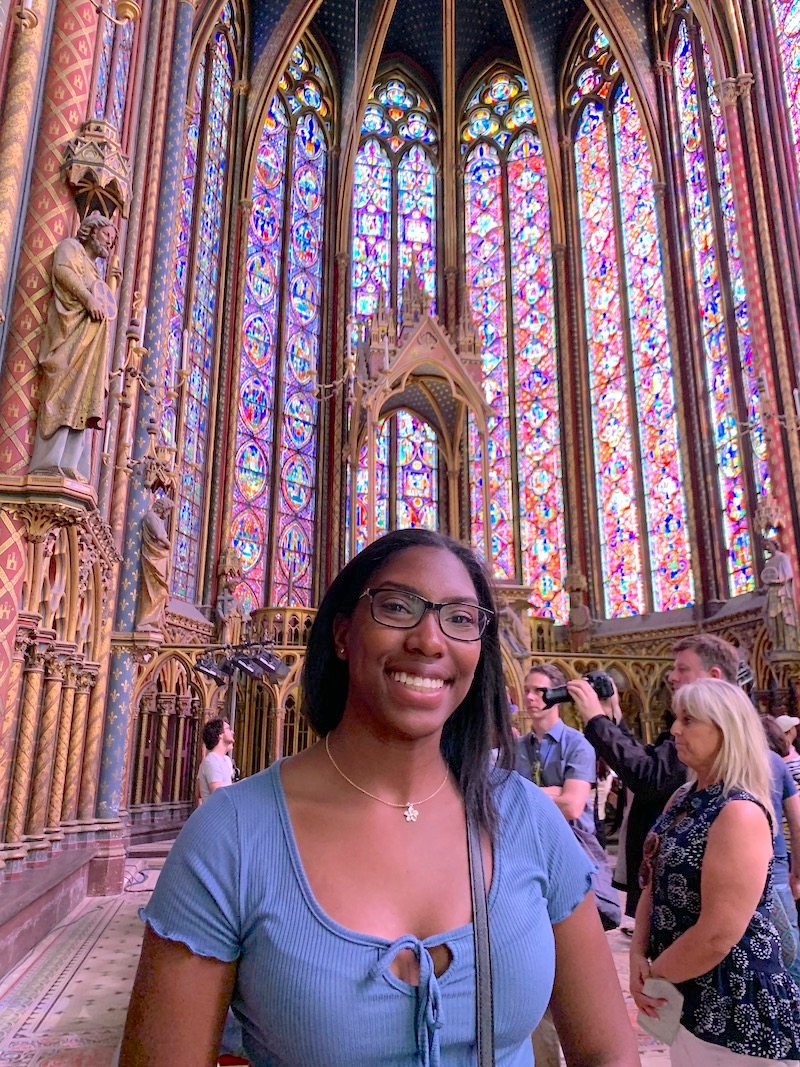
We also got a chance to visit Amsterdam. This has now become one of my favorite places to visit. We had a great time there. Amsterdam is known for a variety of things. But the main things we enjoyed were the canal system and their Holland fries. We also had the opportunity spent most of our time with our cousins. Surprisingly, I found out that one of my cousins is studying to become an Occupational Therapist. It was amazing to hear about the similarities between our adaptive tools and procedures.
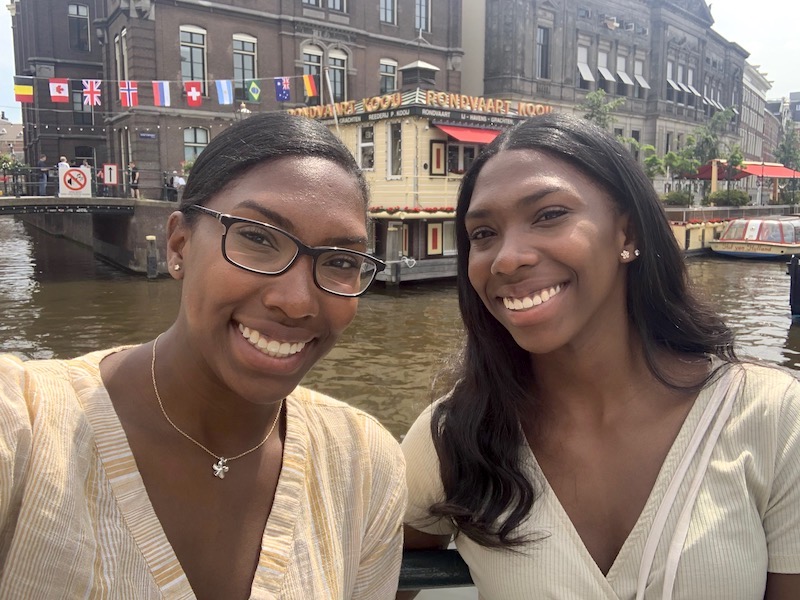
Europe is different from the US for many reasons, but one of the main differences that I enjoyed while there was the transportation system. Since it was the first time traveling internationally without any family, we had to learn how to get around and, it was so easy to figure out. By the end of our trip, I became a pro at using the trains to get to our destinations, with a little help of maps and the people, who were so nice and helpful. Europe is a great place to travel. I hope to go back soon.
⋯

How Cooking Helps Me On A Daily Basis ⟩
June 10, 2019, by Anijah
I learned how to cook at a very late age. In Guyanese culture, it is common for young girls to learn how to cook at the age of 8 or 9 years of age so that they could start putting food on the table while their parents went to work. Both sides of my family are from an English-speaking country in South America called Guyana. My mother spent half of her life in her home country but my siblings and I were born and raised in North America. Both my sister and I did not learn to cook until we were 12, which is a common age for those who were raised in America.
My mom has always loved to cook since she started. She enjoys cooking traditional Guyanese food and trying new things. My mom was also excited to share her love for cooking with her daughters. However, I was not comfortable in the kitchen until I reached college. Once I entered college and had to cook for myself, I realized that cooking meant a lot to me. After a long day in class or at work, I enjoy coming home and making dinner for myself and my roommates for many reasons. The first being the thrill I get once I have successfully made a new dish without burning it. Since I do have this excitement every time I make a new dish, my phone and social media is filled with pictures of my creations and my Pinterest is filled with future recipes. The smell of onions and garlic in a pan and listening to the sizzling of the food cooking allows me to destress after a busy day.
Cooking is an everyday activity that many people engage in to eat, on the most basic level, and for others, cooking allows them to promote a healthy lifestyle. Engaging in an activity that a person truly enjoys will lead to a better physical and emotional life. For me, spending time in the kitchen allows me to accomplish a meaningful life. For anyone who wants to start learning how to cook it is not too late, just find the right recipe and get started.
⋯

What USC has done for me (so far)? ⟩
May 24, 2019, by Anijah
For a very long time I was unsure about what I wanted to do for my future, but what I did know was that I wanted to attend an amazing university located near my family. The first time I applied to USC I did not get accepted, so I had to decide if this university was what I truly wanted. My twin sister and I soon realized that we definitely wanted to attend USC, so we decided to go through with the Trojan Transfer Plan. Ever since I entered high school, I always had the idea that I would attend a four-year university right after graduation, but I believed I would be most successful at a community college first. I attended a CC where I could compete in track and field while completing the necessary steps to transfer to USC. After one amazing year in Sacramento, CA, my sister and I both got into the university of our dreams, USC.
Transferring into a university can be difficult for many reasons, and it can be even more stressful when you are indecisive about what you want to do. I had always participated in sports, so I believed it would be good to get a degree in Human Biology. With that degree, I could go to physical therapy school. I was nervous to switch my major because it is a huge step in any college student’s life when they do so. While switching my major, I also added on a minor in occupational therapy because it is a healthcare profession that worked closely with physical therapists. My first occupational therapy class discussed how occupations allow people to experience a healthier life. USC is one of the few universities to offer undergraduates the opportunity to learn more about this amazing field as a minor.
Halfway through my first semester at USC, I started to realize that I enjoyed the field of occupational therapy. After doing some research, I found myself at one of the information sessions that the OT division offers. Immediately, I noticed how this graduate program accepted people from all educational backgrounds. After attending the session, I met with my advisor so that I could get on track to attend graduate school for occupational therapy. Deciding to transfer to the University of Southern California was a great decision because I truly believe I would have never found such an amazing career!
⋯
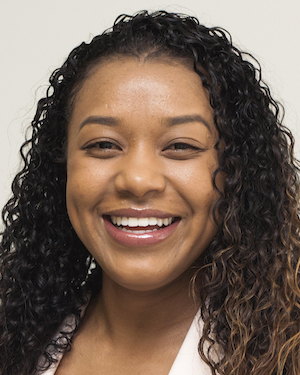
Before I Let Go . . . One Last Blog ⟩
May 14, 2019, by Serena
Beginnings and Endings Diversity Videos
It is nearly unbelievable to think that my time in USC’s Occupational Therapy Master’s program is coming to an end. And Before I Let Go . . . I had to post one last time about my graduation ceremony and a surprise Beyoncé dance video that is near the end of the blog!
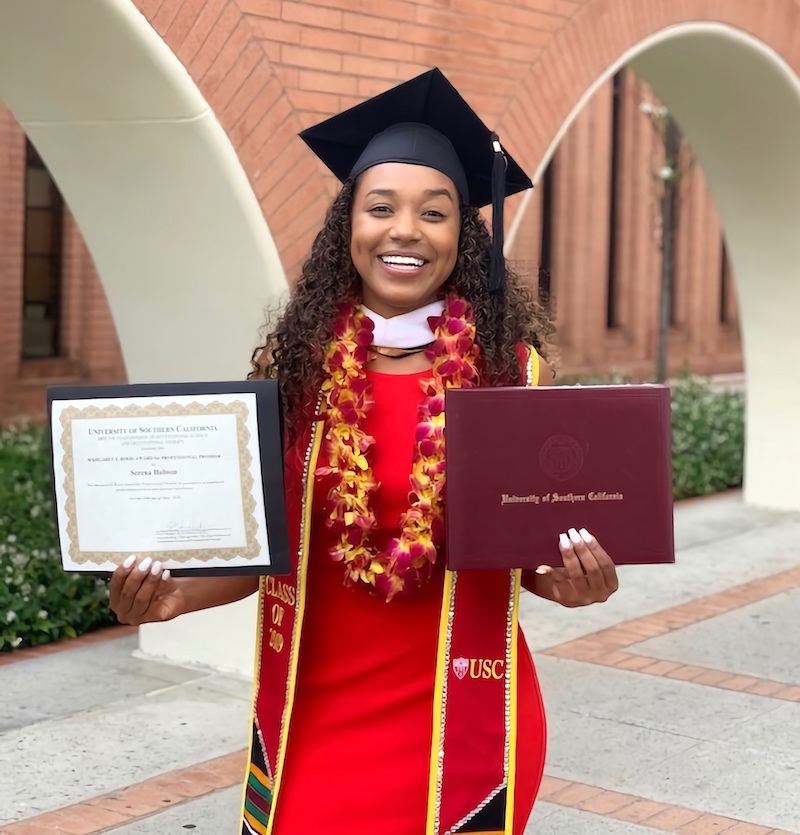
At USC’s Occupational Therapy Graduation ceremony in a feeling of utter bliss and joy after receiving my master’s degree and Award for Professional Promise and Personal Excellence
It is a bittersweet feeling to come to the end of a program that has given me so much! One of the most difficult parts is saying goodbye to the friends and mentors that I have made while in the program.
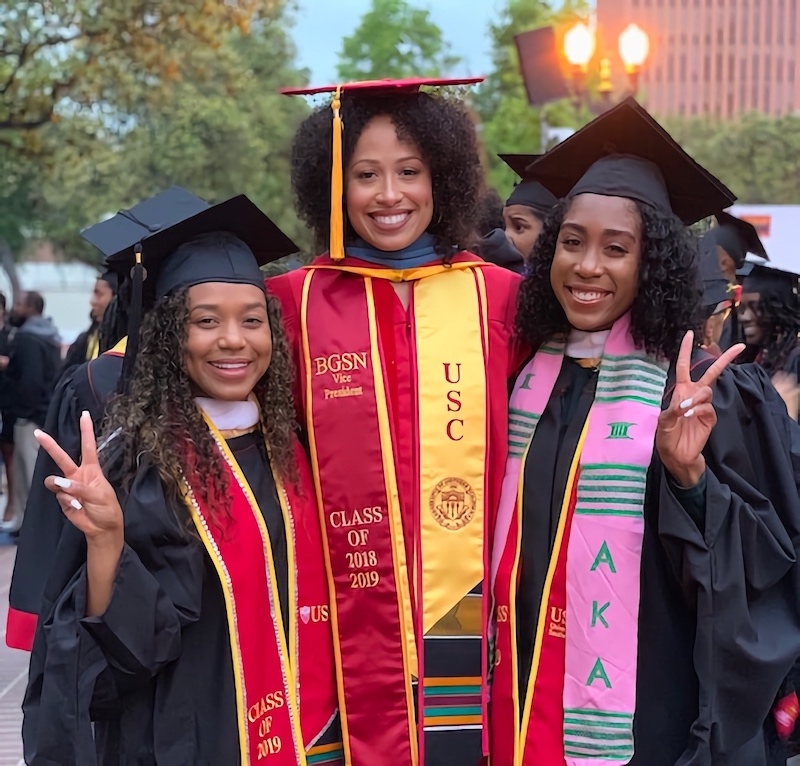
At USC’s Black Graduate ceremony with Miriam Brown and Natasha Strickland
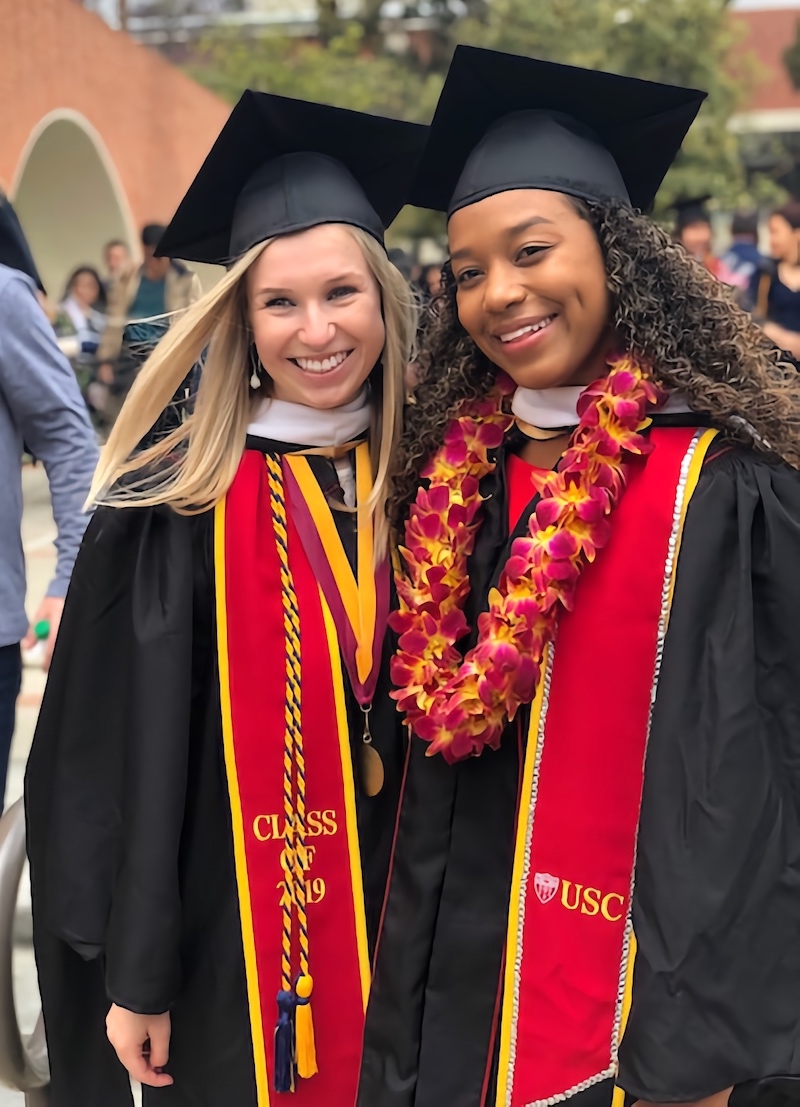
At USC’s Occupational Therapy Graduation ceremony with another student ambassador and friend, Jessica Pederson
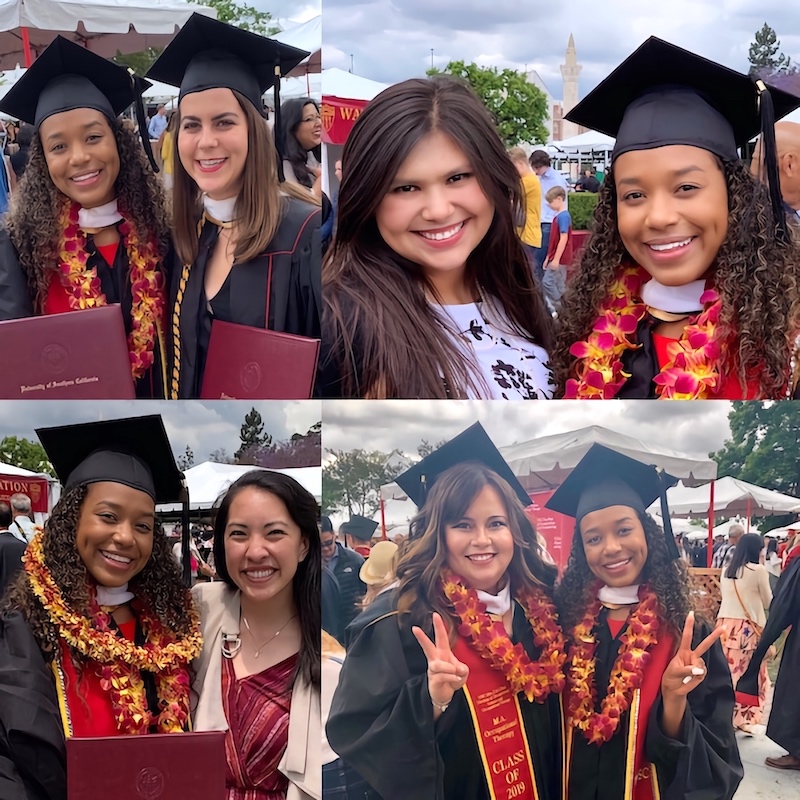
With a few of my friends and cousin at USC’s Occupational Therapy Graduation ceremony
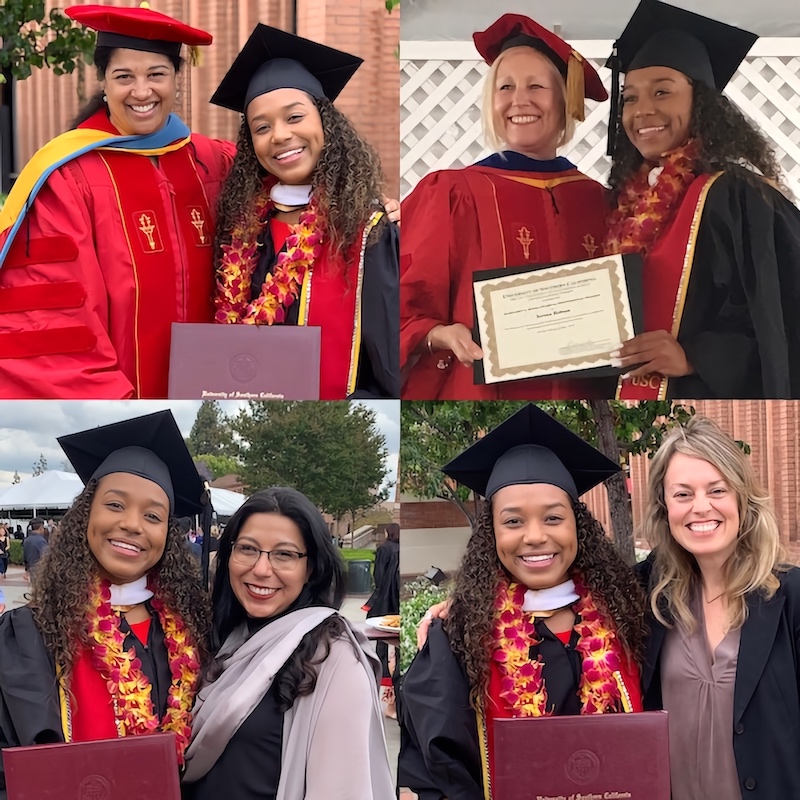
At USC’s Occupational Therapy Graduation ceremony with a few of my mentors (top to bottom, left to right): Dr. Stefanie Bodison, Dr. Julie McLaughlin Gray, Ms. Bianca Ojeda, and Dr. Camille Dieterle
I am thankful to have received a master’s degree but I am most grateful for the lifelong friendships I have formed and mentors I have gained while in the program. We have memories, pictures, and videos that we will cherish forever. In honor of graduation here is one of my favorite videos some of my friends and I put together with the help of our friend in USC’s School of Cinematic Arts.
Lastly, I would like to thank my family for supporting me during my OT and life’s journey. At a time of great accomplishments comes the need to remember how you achieved your successes. Without my family I would not be who I am or where I am today. As OTs we know that the community and social supports play a huge role in quality of life and health. My personal accomplishments will always and forever be my community’s accomplishments, my family’s accomplishments.
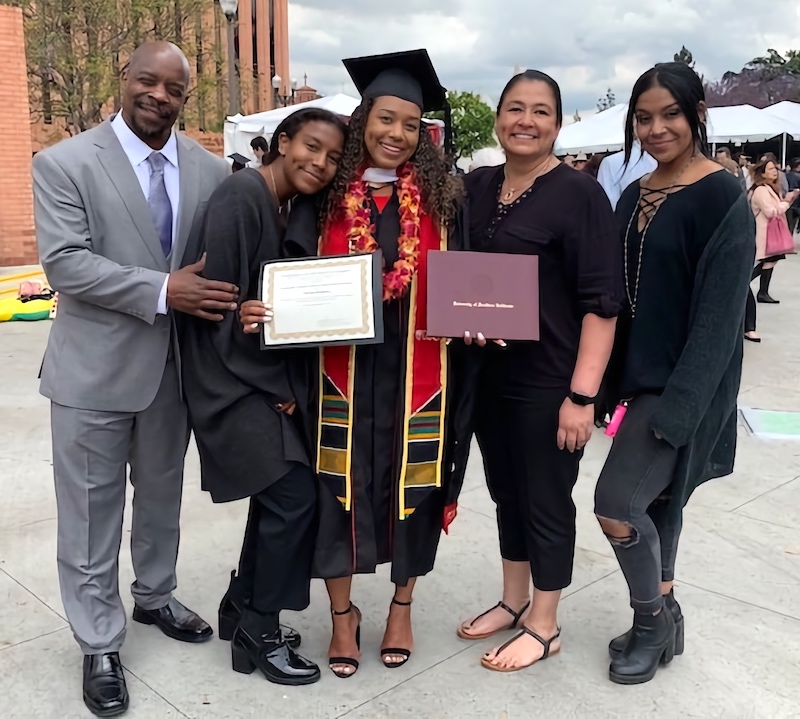
At USC’s Occupational Therapy Graduation ceremony with my family (left to right): my dad, baby sister, me, mom, and middle sister
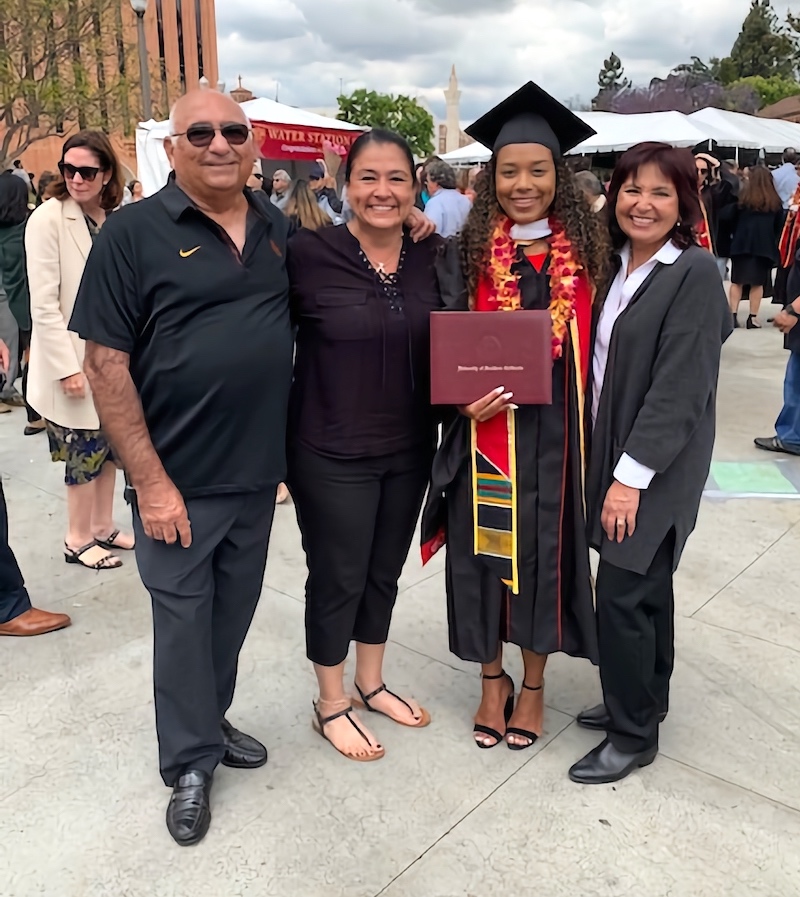
At USC’s Occupational Therapy Graduation ceremony with other family members (left to right): grandfather, mom, me, and aunt
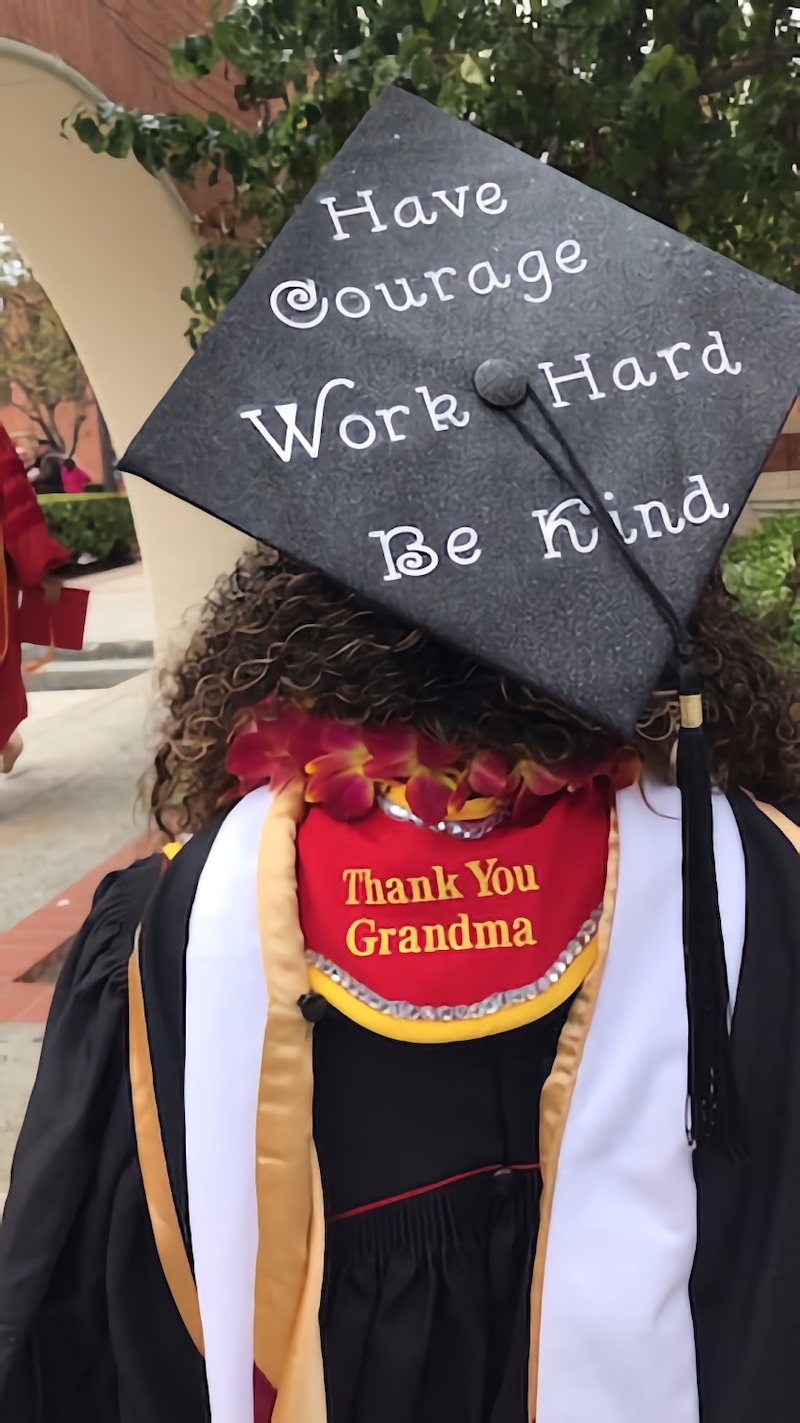
My graduation cap decorated by my mother in memory of my grandmother who instilled courage, exceptional work ethics, and kindness into my heart
Thankfully, I will be staying at USC for another year to complete my doctorate at USC’s Occupational Therapy Faculty Practice (OTFP). At the OTFP I will be pursuing my interests in health and wellness by receiving mentorship while delivering Lifestyle Redesign® interventions to promote healthier habits and routines.
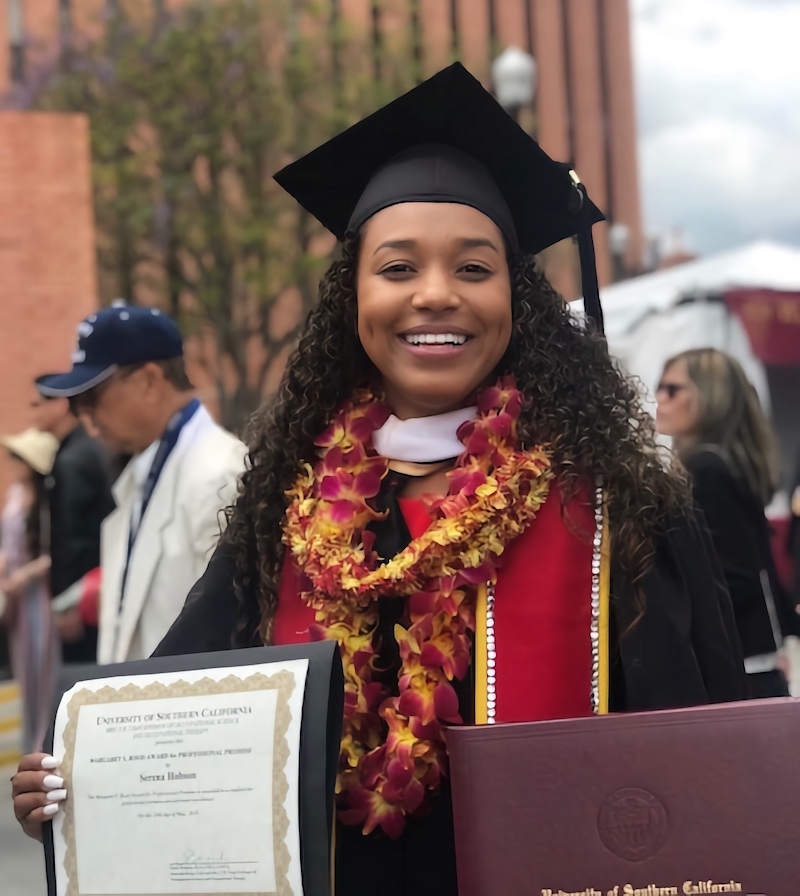
Fight On!
⋯





